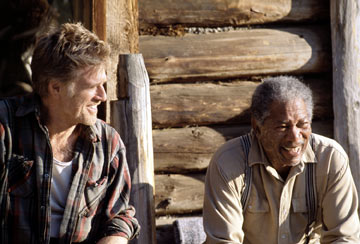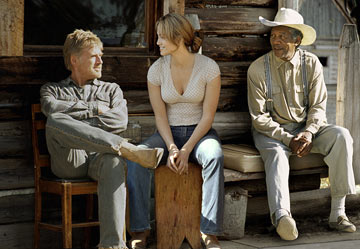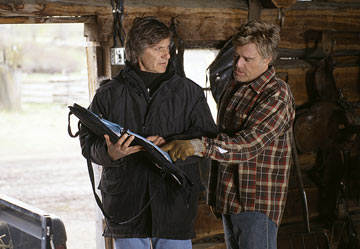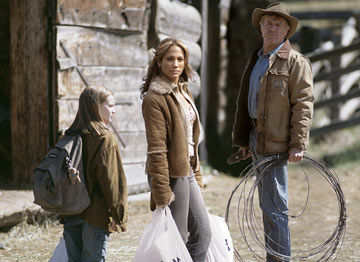.jpg)

PopEntertainment.com >
Feature
Interviews - Actors
> Feature Interviews P
to T > Robert Redford
 ROBERT
REDFORD
ROBERT
REDFORD
BEARS
ANOTHER LIFE IN HIS LATEST FILM
by Brad Balfour
Copyright ©2005
PopEntertainment.com. All rights reserved.
Posted: September 9,
2005.
In An
Unfinished Life, legendary actor Robert Redford tackles a character
he's wrestled with before, a massive bear. In this film he plays co-star
Jennifer Lopez's father-in-law who wrestles with her as she is forced to
move in with him in order to take care of her daughter. Finally helmed by
veteran director Lasse Hallstrom, the film was under development for
several years (Redford’s former cinematic partner Paul Newman almost
played the lead) until it was completed with the unlikely pairing of
Redford and Lopez.
How was the bear?
The bear was tame, is what they said.
Did you interact with the bear before shooting began?
Not very much. I don't subscribe to the idea of wild animals being tamed.
I don't think they're ever REALLY tame. They can be tamed for periods of
time, but I would never take for granted a wild animal.
I read that you had a bad previous experience with a grizzly. What was
it like working with that big bear?
Years ago, I was making a film called Jeremiah Johnson, and the
scene called for me to be chased by a bear and the scene got out of hand
and the camera had a malfunction and I had to keep running around a tree.
The bear got all excited and started really chasing me and I had to jump
in the tree to save my neck. I made it, but I said, "I'm never going to do
this again." So, now I'm doing it again and why am I doing it again?
Because I got paid to do it.
You said you did this because you got paid. Do you do certain films now
because you get paid?
I've never done anything for the pay. I was kidding. [I did this] because
I liked the script. I did think a lot about the bear. I said, "Gee, I
wonder what they're going to do with this." But I did it because I liked
the script and I liked the character and I liked what the script was
trying to say.
 Did
you have to wrestle with a beast of another kind — Jennifer Lopez's
following?
Did
you have to wrestle with a beast of another kind — Jennifer Lopez's
following?
I didn't think about it because I didn't have to; we were in Canada in a
very remote place and were working there as actors. She was just Jennifer.
We were playing parts in a movie and she didn't bring with her any of the
business stuff. It didn't enter the picture, so I never thought about it.
I never dealt with it. She's a talented actor, so I just enjoyed her, but
I never thought about her audience or anything like that.
The film is basically about forgiveness. What transgression have you
had to forgive?
There's a long list.
Name one.
This is just one small example, there are others, but I don't want to
waste time here thinking [about it]. There was a critic that I became
friendly with early in life and I always wondered if that was dangerous to
have a friendship with a critic, because what would happen if that critic
were to review your films? I thought about it and worried about it, but
didn't do anything about it. Then later on, the
 critic
began to review my films and I thought that would not be a good idea and I
told him: "Don't you think it's not such a good idea? That it would be a
conflict?" And he said, "No, no problem at all." And then he and I had a
falling out as friends, and from that time I got savaged in reviews. The
abuse was so great, I mean, it was so extreme, his punishing me in print.
I had no defense so I had to forgive it and I eventually did.
critic
began to review my films and I thought that would not be a good idea and I
told him: "Don't you think it's not such a good idea? That it would be a
conflict?" And he said, "No, no problem at all." And then he and I had a
falling out as friends, and from that time I got savaged in reviews. The
abuse was so great, I mean, it was so extreme, his punishing me in print.
I had no defense so I had to forgive it and I eventually did.
Are you friends now?
No, I just forgave. That was as far as I could go.
Morgan Freeman often plays the conscience in a film. What do you think
makes him seem so perfect for these roles?
I just think that Morgan has something about him that is very soulful; it
has to do with the way he looks, it has to do with his skill as an actor
and the depth of his life experience and his career and you put it all
together and you have a man that emits a great deal of soul in his work
and I think that's the reason.
This film is also about facing your fears. Do you have any fears that
you have faced down and are you sacred of anything now?
Sure. I'm probably not afraid of the things you might think. I'm not going
to go into a personal thing here, but I'm afraid of certain types of
people who are not straight—who have an agenda other than the one they are
talking about; and the agenda they have is highly immoral, maybe even
criminal, but is disguised as a performance and you have to work hard to
figure it out. If you can't figure it out, when you can't figure it out,
you sense it's there--and it's frightening. I'm not afraid of the dark.
I'm not afraid of the unknown. I'm attracted to the unknown. I don't want
to be a prisoner of what is known, so I like not knowing certain
things. I like mystery. I'm frightened sometimes by my children
[laughs.] They scare me to death because they've become the children I wanted them to
be—independent—and their independence sometimes scares me. They take
chances and so, as a parent, that frightens me. I get frightened by forces
that take things in my world, my life or my country that are beyond my
control. They take it down a dark path, which is what I feel is happening
now, and I have no ability to have a voice in it, well, maybe a little
voice, but it doesn't mean much. When I can see something that I value
highly being taken down a destructive road because of either ignorance or
lack of experience or limitations or over-exercised ideology, it frightens
me because I know they don't get it and they are not likely to change.
That's frightening—particularly when you can see the results are. So,
right now I'm frightened for my country.
 Swedish
director Lasse Hallstrom [The Ciderhouse Rules, What's Eating Gilbert
Grape?] was great for this project.
Swedish
director Lasse Hallstrom [The Ciderhouse Rules, What's Eating Gilbert
Grape?] was great for this project.
Lasse brings to the film his own sensibility, which has a very definite
style and rhythm to it. I like a lot of his films and I liked them because
he allows a film to breathe and develop in its own natural way and I think
films like that, at least for me, have become more and more appealing as
the industry has moved towards fast-paced, in-your-face, high-velocity
films. They have a lot of cutting and fancy tricks with the camera. The
way the film business has moved more and more towards the effects of high
technology, animation, commercials and music videos, all of those elements
have affected the movie-making business and so the films that give you a
little bit more time to feel things and digest things have sort of been
pushed a little to the side; I am drawn to filmmakers who still have the
courage to make those kinds of films. Lasse does and has a European
sensibility, which means that he has a very strong attachment to the
humanistic side.
That's something you share with Paul Newman. Are you two planning to
make another movie?
We're talking about it. That's true. I think Paul and I are alike in that
we probably are reluctant to talk about something that is not real yet,
but we are talking about something.
Have you been looking for something to do together for long?
Well, I don't think we really spent a lot of energy. I think it's sort of
surprising that nothing came to us in 20 years, considering Hollywood's
penchant for sequels and remakes and things like that. They could never
find a script that might suit us. The stuff that came to us wasn't any
good.
CLICK
HERE TO SEE WHAT ROBERT REDFORD HAD TO SAY TO US IN 2013!
CLICK HERE TO SEE WHAT
ROBERT REDFORD HAD TO SAY TO US LATER IN 2013!